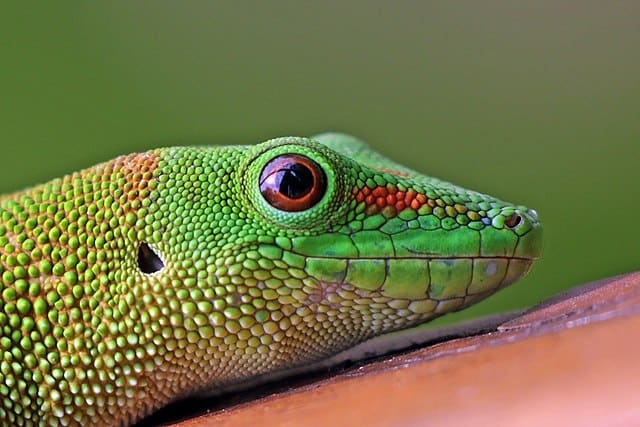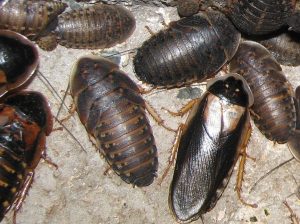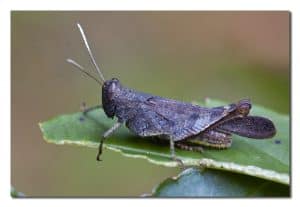Giant Day Geckos are the biggest day geckos around, hence their name. They are also some of the few geckos that are omnivorous. This means that they eat both insects and fruits. Is very important to offer them a balanced diet to keep them healthy and happy.
In this article, will talk about what types of insects these friendly geckos like and what does their normal diet looks like.
Can Giant Day Geckos Eat Insects? What Are The Main Types?

As omnivorous creatures, Giant Day Geckos thrive on a balanced diet that contains around 60% insects and around 40% fruits and vegetables. These geckos are quite large, which means they won’t have a hard time eating most insects. But it’s still better to feed them insects that are easy to chew and digest.
This is why brown crickets are the go-to feeder insects for this species of gecko. The best thing about them is that they are incredibly affordable and are very easy to chew. It’s very important to help your gecko to exercise its natural hunting skills by allowing it to hunt insects around the enclosure. And since those crickets are harmless but active, they make the perfect choice for Giant Day Geckos.
If you don’t have access to brown crickets, you can opt for black crickets or locusts. They are both excellent feeder insects and they are easy to hunt by the gecko. When it comes to other types of crickets, you need to make sure they don’t have the typical strong jaw. This is because they can hurt the gecko in self-defense. And never place more than 2 or 3 crickets in the enclosure at the same time as they can intimidate the pet.
Once you have chosen the feeder insects, make sure they are always smaller than the space between the gecko’s eyes. Otherwise, the gecko risks choking while trying to chew the insect. So if you have smaller geckos, don’t buy too many crickets at the same time. This is to prevent them from growing too big for the juveniles.
If you find insects around your garden or even in your home, refrain from feeding them to your gecko. You never know where these insects have been, what parasites they carry, and whether they have pesticides on them or not. Even the smallest garden bug can cause bad indigestion to your pet.
Every meal needs to be dusted with some kind of supplement powder. This can be calcium, vitamins, etc. Their job is to offer your gecko everything that it doesn’t get naturally from its food. And while insects are a very important part of the Giant Day Gecko’s diet, fruits, and a few vegetables are also a must.
Can Giant Day Geckos Eat Mealworm Beetles?
Mealworms are very popular when it comes to feeding geckos in captivity. This is because they are affordable and they usually come in a special package that also includes their food. This makes them last a very long time, and if you want to make them last even longer, you can put them in the fridge. They will reach a hibernation state and they won’t need food or water for a while.
But unfortunately, mealworms have a hard exoskeleton that is both hard to chew and digest. This is why you need to avoid feeding them to Giant Day Geckos that are younger than 2 years. Otherwise, they can cause a bad indigestion and some geckos might later turn their heads to them.
Mealworms are very high in protein, which is why they make an excellent treat for adult geckos. But they should only be fed once or twice a week. Once the mealworm matures, it becomes a darkling beetle. And those have an equally hard exoskeleton so make sure you only feed them to adult geckos as well.
There are some geckos that thrive on eating lots of mealworms and some people might think this is the case for every gecko, which is not. So make sure you’re only feeding them as treats now and then. Giant Day Geckos cannot lead a healthy life while being fed nothing but mealworms.
They are not very hard to gut-load but they should still be dusted with supplement powder to increase the health benefits.
Dubia Roaches
 Dubia Roaches are very high in nutrients and are an excellent food source for Giant Day Geckos. They’re easily found in pretty much any reptile food supply store and they’re not pricey either. You’ll be able to feed your gecko a more varied diet if you have the time to take care of these types of insects as well.
Dubia Roaches are very high in nutrients and are an excellent food source for Giant Day Geckos. They’re easily found in pretty much any reptile food supply store and they’re not pricey either. You’ll be able to feed your gecko a more varied diet if you have the time to take care of these types of insects as well.
When it comes to breeding and keeping them, it couldn’t be any easier. All they need is a little bit of space and food. They don’t require a lot of attention and there’s not a high risk of losing them in your home and create an infestation. Gut-loading is also not very difficult and adult Giant Day Geckos can easily eat them.
Beetles
Beetles have a pretty hard shell, which is why most small species of geckos can’t eat them. They’re also pretty difficult to chew and digest by younger Giant Day Geckos as well. These insects have a hard exoskeleton as well, not just the shell.
But once the Giant Day Gecko is an adult, its jaw becomes much stronger and the digestive system is not so sensitive anymore. This means that they will be able to eat beetles just fine and they’re a great addition to their diet. Just make sure the gecko is at least 18 months old before feeding it beetles.
Ants
Ants may look small but they are very well-known for their strength and very powerful bites. Just a single ant can cause some very painful bites to a gecko and if the small insect is swallowed whole, it can do some serious damage ton the inside of the gecko as well. But luckily they die fast. Even so, they’re not a good idea for geckos, unless they’re dead. But geckos rarely eat dead prey.
Another problem with ants is their great capability to burrow and eat wood. If you let them loose inside the enclosure, hoping the gecko would catch them, you’re going to have a problem on your hands pretty soon, especially if the walls are made of wood. It’s just best to avoid these pesky little creatures.
Spiders
Spiders are actually very common prey for geckos in the wilderness. However, some can end up with some serious problems if the spider is dangerous or simply too large to be overpowered. If you can get them from a reputable food supplier, then you’ll know for sure that they are not dangerous for your gecko. However, avoid feeding your gecko house spiders.
You never know exactly what type of spider that is and whether it has any chemicals on it or not. You never know where it’s been. More than that, house spiders can be full of parasites that would rather get transferred to your pet.
Rolly Pollies
Rolly Pollies are not too bad for Giant Day Geckos and even the younger ones can eat them. But for some reason, most geckos turn their heads to them and wait for another treat. And if your gecko is used with the tastiest insects, the chance of being pick is even higher.
But if your gecko likes them, you should be able to get them from a reputable breeder at an acceptable price.
Cockroaches
Cockroaches are great for most Giant Day Geckos but they should be adults before starting to eat them. These insects are quite hard-shelled as well and they’re best kept for older and healthy geckos. Don’t give them to your sick gecko either as they are hard to chew and it can be inconvenient to them.
Another thing to know about them is that they are very easy to keep and they don’t need much attention to stay alive for a long time. They are also easy to breed and if you’re a good keeper, you might only have to buy a single batch throughout the gecko’s life.
Moths
Moths can grow to be quite large but most of them are easy to eat by a Giant Day Gecko. Don’t feed your pet the moths you have around your home as they can be full of parasites and have pesticides on them. But a good reptile food supplier should be able to provide them for you if you want them.
It’s not a common feeder insect for geckos in general simply because there are other choices that are much better available.
Dried Crickets
No matter what type of gecko you have, you need to keep in mind that they typically don’t eat dead prey. They treat it as a spoiled meal and will refuse to even get close to the corpse. However, there are a few geckos that are not really bothered by dead prey and will eat them anyway. They’re just not common at all.
Black Crickets

Black crickets are absolutely great for Giant Day Geckos. They contain most of the nutrients they need and they’re easy to hunt and eat. Crickets in general are an excellent food source for most geckos, but Giant Day Geckos actually thrive on them. Brown crickets and locusts are just as good and they’re highly recommended as staple food.
Ladybugs
Ladybugs are generally acceptable as food but there aren’t many geckos that will eat them. This is because these bugs tend to release a slime that tastes horrible when they get hurt. So you can imagine that most geckos would rather eat something else.
Earwigs
Earwigs are not recommended to any type of gecko, especially younger ones. This is because they are known to be quite strong and can do some real damage before the gecko gets to eat them. If you’re lucky enough to have a gecko that eats dead prey, then you can cut the heads of the earwigs right before feeding them to your pet. Otherwise, it’s better to avoid them.
What can Giant Day Geckos eat besides insects?
As mentioned before, Giant Day Geckos need a balanced diet that includes fruits and vegetables as well. After the gecko had its fair share of insects you can feed it a few slices of fruit or some veggie you have around. A great thing about those geckos is that they are quite easy to tame, and you can teach them to eat from your own hand.
Tropical fruits are almost always the best option for geckos in captivity. This includes bananas, mango, papaya, pineapple, etc. They are all very delicious and they are the closest thing you can find to what they actually eat in the wild. In the wilderness, geckos eat the fruits that have fallen from trees and lots of nectar. But you can also feed them other types of food you have around the house, such as apples, berries, cherries, etc.
You can also offer them a few well-sliced pieces of vegetables from time to time. It might take a while to find out what exactly your pet loves. You can also place a few different pieces of vegetables and fruits in a blender and offer the mix to the gecko on a small, straight plate. This helps it to lick as much as it wants without risking choking on the veggie.
Commercial food is another thing you need to keep an eye on for these species of geckos. Today, commercial foods have been perfected and many of them can be used to replace insects as well. The best one for Giant Day Geckos is the commercial food marketed towards Crested Geckos. This is because they are also omnivorous and eat a very similar diet.